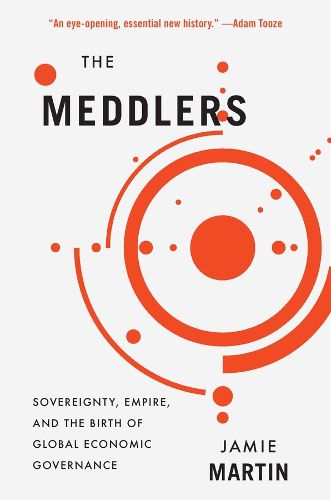Readings Newsletter
Become a Readings Member to make your shopping experience even easier.
Sign in or sign up for free!
You’re not far away from qualifying for FREE standard shipping within Australia
You’ve qualified for FREE standard shipping within Australia
The cart is loading…






"Martin's impressive new book, The Meddlers, considers the League of Nations and other interwar precursors of 'neutral' institutions of doux commerce to show how closely the 'birth of global economic governance' was entangled with empire." -David Priestland, London Review of Books
"Few standard accounts of international economic history hold up to scrutiny in Jamie Martin's bold history of economic governance." -Dina Gusejnova, Times Literary Supplement
"The Meddlers is an eye-opening, essential new history that places our international financial institutions in the transition from a world defined by empire to one of nation states enmeshed in the world economy."
-Adam Tooze, Columbia University
Institutions like the International Monetary Fund and World Bank exert enormous influence over the domestic policies of many states. While they were created in the aftermath of World War II, if we want to understand their deeper origins and the ideas and dynamics that shaped their controversial powers, we must turn back to the explosive political struggles that attended the birth of global economic governance in the early twentieth century.
The Meddlers tells the story of the first international institutions to preside over the world economy, including the League of Nations and Bank for International Settlements, created after World War I. These institutions endowed European and American bankers, colonial authorities, and civil servants with extraordinary powers: to enforce austerity, coordinate the policies of independent central banks, oversee development programs, and regulate commodity prices. Martin shows how the challenges that institutions like the IMF pose to democracy today first emerged during a period of imperial competition and war at the beginning of the twentieth century.
$9.00 standard shipping within Australia
FREE standard shipping within Australia for orders over $100.00
Express & International shipping calculated at checkout
"Martin's impressive new book, The Meddlers, considers the League of Nations and other interwar precursors of 'neutral' institutions of doux commerce to show how closely the 'birth of global economic governance' was entangled with empire." -David Priestland, London Review of Books
"Few standard accounts of international economic history hold up to scrutiny in Jamie Martin's bold history of economic governance." -Dina Gusejnova, Times Literary Supplement
"The Meddlers is an eye-opening, essential new history that places our international financial institutions in the transition from a world defined by empire to one of nation states enmeshed in the world economy."
-Adam Tooze, Columbia University
Institutions like the International Monetary Fund and World Bank exert enormous influence over the domestic policies of many states. While they were created in the aftermath of World War II, if we want to understand their deeper origins and the ideas and dynamics that shaped their controversial powers, we must turn back to the explosive political struggles that attended the birth of global economic governance in the early twentieth century.
The Meddlers tells the story of the first international institutions to preside over the world economy, including the League of Nations and Bank for International Settlements, created after World War I. These institutions endowed European and American bankers, colonial authorities, and civil servants with extraordinary powers: to enforce austerity, coordinate the policies of independent central banks, oversee development programs, and regulate commodity prices. Martin shows how the challenges that institutions like the IMF pose to democracy today first emerged during a period of imperial competition and war at the beginning of the twentieth century.